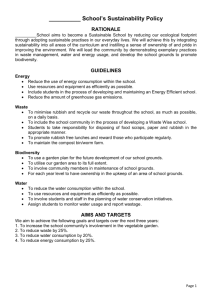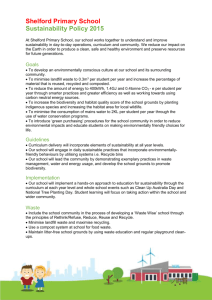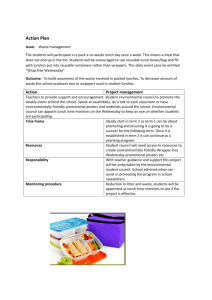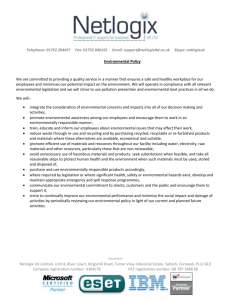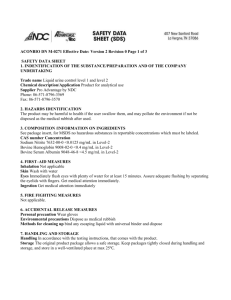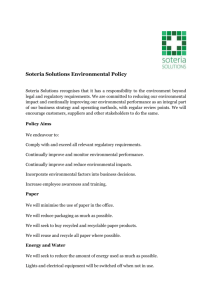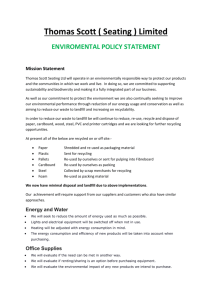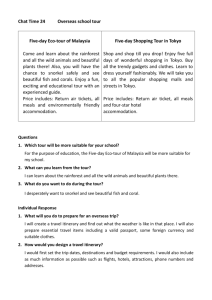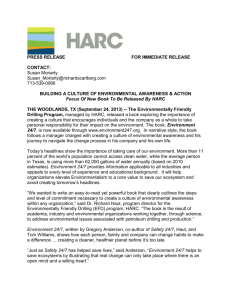Sustainability-Policy-CERES-CPS2015
advertisement
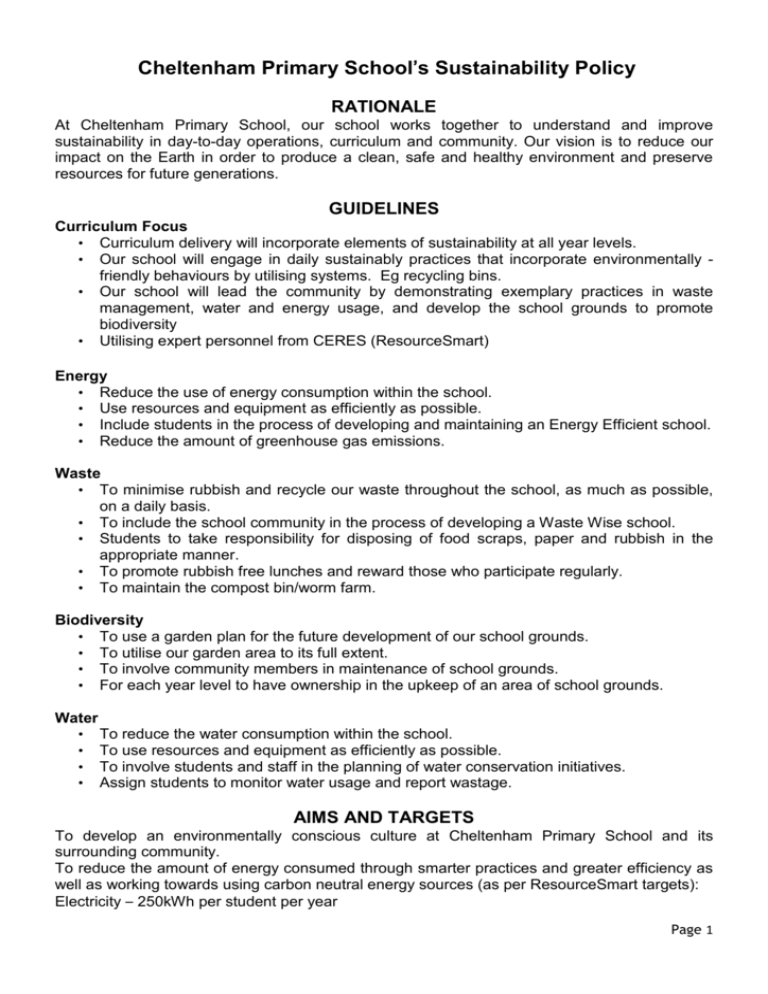
Cheltenham Primary School’s Sustainability Policy RATIONALE At Cheltenham Primary School, our school works together to understand and improve sustainability in day-to-day operations, curriculum and community. Our vision is to reduce our impact on the Earth in order to produce a clean, safe and healthy environment and preserve resources for future generations. GUIDELINES Curriculum Focus • Curriculum delivery will incorporate elements of sustainability at all year levels. • Our school will engage in daily sustainably practices that incorporate environmentally friendly behaviours by utilising systems. Eg recycling bins. • Our school will lead the community by demonstrating exemplary practices in waste management, water and energy usage, and develop the school grounds to promote biodiversity • Utilising expert personnel from CERES (ResourceSmart) Energy • Reduce the use of energy consumption within the school. • Use resources and equipment as efficiently as possible. • Include students in the process of developing and maintaining an Energy Efficient school. • Reduce the amount of greenhouse gas emissions. Waste • To minimise rubbish and recycle our waste throughout the school, as much as possible, on a daily basis. • To include the school community in the process of developing a Waste Wise school. • Students to take responsibility for disposing of food scraps, paper and rubbish in the appropriate manner. • To promote rubbish free lunches and reward those who participate regularly. • To maintain the compost bin/worm farm. Biodiversity • To use a garden plan for the future development of our school grounds. • To utilise our garden area to its full extent. • To involve community members in maintenance of school grounds. • For each year level to have ownership in the upkeep of an area of school grounds. Water • • • • To reduce the water consumption within the school. To use resources and equipment as efficiently as possible. To involve students and staff in the planning of water conservation initiatives. Assign students to monitor water usage and report wastage. AIMS AND TARGETS To develop an environmentally conscious culture at Cheltenham Primary School and its surrounding community. To reduce the amount of energy consumed through smarter practices and greater efficiency as well as working towards using carbon neutral energy sources (as per ResourceSmart targets): Electricity – 250kWh per student per year Page 1 Gas – 0.9GJ per student per year Greenhouse Gas – 0.4 tonnes CO2 per student per year Landfill waste output – 0.3m3 per student per year Water – minimized to 4KL per student per year To introduce ‘green purchasing’ procedures for the school community in order to reduce environmental impacts and educate the community on making environmentally friendly choices. IMPLEMENTATION As part of the School Environmental Management Plan (SEMP) we will endeavor to achieve the following: Energy • • • • • To promote a ‘switch off and save’ policy for technological equipment, lighting and heating/cooling. Students to engage in units of work relating to energy. Students will investigate the best ways to conserve energy. Undertake energy audits to gather information about energy usage and identify areas fro improvement Develop a program that promotes sustainable transport (e.g ride to school) and undertake audits to measure improvements Waste • To assign students to dispose of waste and recycled products daily in the appropriate manner. • To assign students to monitor rubbish free lunches and each term award the class who has the most rubbish free lunches. • For monitors to collect food waste daily and transfer it to the compost bin. • For students to dispose of paper into recycling bins. • Use recycled paper for printers, photocopiers and Eco-Pads. • Promote the reuse principle of paper in classrooms, staffroom and office. • Maintain litter free school grounds Biodiversity • Consult local community members on ways to improve our garden (e.g. Where to plant, what to plant). • Involve community members in planting and maintaining our gardens. • Engage students and staff in the maintenance of our gardens. • To grow and harvest a range of vegetables/herbs to be utilised in cooking classes. • Encourage an appreciation of the natural environment through learning experiences e.g curriculum, excursions and camps. • Increase the biodiversity in the school yard in order to support local flora and fauna. • Showcase native and indigenous gardens as a model to the school and wider community (Cheltenham school sanctuary). Water • • • • To promote a ‘water-wise turn off’ policy. Students to engage in units of work relating to water conservation. To assign students to monitor water usage and report wastage. Plant trees and plants that require minimal watering. Page 2 • • Appreciate water as a precious natural resource. Choose the most effective means of conserving water (e.g water tanks for flushing toilets). Green Purchasing Purchase environmentally – friendly paper for printers and photocopiers. Purchase environmentally – friendly paper alternatives for items such as toilet paper, hand towels and serviettes. COMMUNITY INVOLVEMENT We will encourage community participation in environmental projects undertaken, as well as, invite parents with expertise to help maintain and improve our school environment. We will also promote sustainable living through educating the school community through our students. All people within our school will be informed and responsible for implementing these programs. The various committees in conjunction with the Principal will be responsible for keeping records and reporting on the outcomes and progress of each program to the whole school community, through school newsletters and the annual report. The parties involved will provide reports to staff and School Council outlining the goals, aims, costing, savings and other relevant issues. EVALUATION This policy will be reviewed as part of the school’s four year review cycle. Page 3
